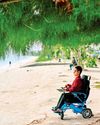
Dr Monal Velangi, senior dietician at K.J. Somaiya Medical College and Research Centre, Mumbai, holds a PhD in foods, nutrition and dietetics from Mumbai University. She has substantial research experience, in India and abroad, in clinical dietetics, community health and the role of nutrition in managing lifestyle diseases and promoting overall wellbeing. She enjoys reading, travelling and cooking.
Nutrition is not one-size-fits-all: Every individual has unique needs based on genetics, body composition, nutritional status, blood parameters, lifestyle and routine. Age, gender and many other factors must be considered to arrive at the optimal nutrition for each person. Individual preferences must also be factored in to improve adherence to dietary recommendations.
Common nutrition myths: Only crash diets or weight-loss pills result in weight loss; healthy eating is expensive; zero-carb diets are best; diabetics should avoid eating fruits; protein supplements are necessary; zero-cholesterol oils are great for heart health.
Celebrities are not nutrition experts: Celebrities are experts at what they do, but they are not authorities on nutrition. A proper diet plan is based on individual factors such as their nutritional status, genetics and routine. Unless the celebrity is also a certified nutritionist, their diet recommendations should be treated with scepticism.
Avoid fad diets: Fad diets, such as ketogenic and intermittent fasting, should not be followed without proper medical advice. Potential consequences include ketosis (raised levels of ketones in the blood stream), hypoglycaemia (unhealthy drop in the blood glucose level), nutritional deficiencies, weakness, fatigue, impairment of neurological functions, mental health issues, poor focus and concentration, kidney issues, drastic muscle loss and yo-yo weight cycling (repeated gain and loss of weight).
هذه القصة مأخوذة من طبعة January 05, 2025 من THE WEEK India.
ابدأ النسخة التجريبية المجانية من Magzter GOLD لمدة 7 أيام للوصول إلى آلاف القصص المتميزة المنسقة وأكثر من 9,000 مجلة وصحيفة.
بالفعل مشترك ? تسجيل الدخول
هذه القصة مأخوذة من طبعة January 05, 2025 من THE WEEK India.
ابدأ النسخة التجريبية المجانية من Magzter GOLD لمدة 7 أيام للوصول إلى آلاف القصص المتميزة المنسقة وأكثر من 9,000 مجلة وصحيفة.
بالفعل مشترك? تسجيل الدخول

Walking in pine forest can have the same effect as a prescription drug
INTERVIEW - KATHY WILLIS, professor of biodiversity, the University of Oxford, and author, Good Nature

MORE THAN A HELPING HAND
Maria Victoria Juan spent a lifetime healing wounded soldiers, and she can't think of anything she could have done better

Against all odds
Mohamed Raishan Ahmed was born with spinal muscular atrophy, which made him unable to sit, stand or walk. Recently, the Maldivian underwent a rare, complex surgery in India that now allows him to sit upright. At 23, the fact that he is alive is in itself an achievement. But he has gone beyond mere survival-with a pursuit of excellence

A pacemaker tale
From science fiction to reality, with a touch of southern Indian wisdom

Driving safe
Taxi drivers endure gruelling hours, cramped seats and relentless traffic, making them prime candidates for health issues like back pain, hypertension, diabetes and insomnia.

Good food, good life
From the moment of birth, we establish a relationship with food—a nourishing link that requires care and attention to stay healthy

POOR SLEEP IN MIDLIFE COULD AGE YOUR BRAIN FASTER
PEOPLE WHO EXPERIENCE SLEEP ISSUES, such as difficulty falling asleep or staying asleep in their 40s, may show more signs of brain ageing in late midlife. Poor sleep may accelerate brain atrophy that is associated with dementia.

BRAIN SCANS SHOW MINDFULNESS MEDITATION CAN REDUCE PAIN
CAN MINDFULNESS MEDITATION actually relieve pain, or is it just a placebo effect?

NON-SURGICAL OPTION TO EASE KNEE ARTHRITIS
A NEW, MINIMALLY INVASIVE procedure called genicular artery embolisation (GAE) can effectively reduce pain, improve quality of life and reduce progression of the disease and the need for knee replacement surgery in people with knee osteoarthritis.

EARLY ONSET DIABETES, BELLY FAT LINKED TO DEMENTIA
FACTORS SUCH AS DIABETES and belly fat in midlife can put you at risk of dementia and Alzheimer's disease later in life.